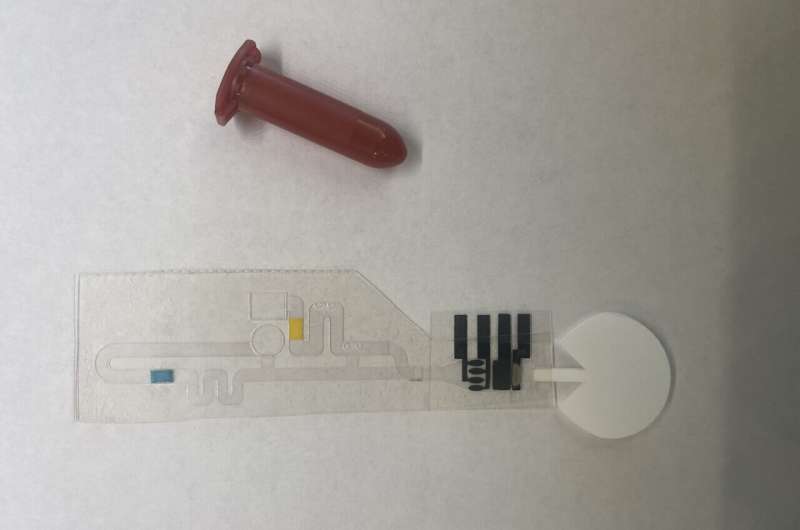This article has been reviewed according to Science X's editorial process and policies. Editors have highlighted the following attributes while ensuring the content's credibility:
fact-checked
trusted source
proofread
Improving access to heart-failure screening with a low-cost saliva test

Heart failure is a leading cause of death worldwide and is especially fatal for people who don't have access to medical facilities. So, a team of researchers aims to bring heart failure screening from the lab to the home. Their point-of-care electrochemical biosensor prototype, which resembles a see-through lateral flow test for COVID-19, can measure levels of two biomarkers for heart failure in as little as 15 minutes from just a drop of saliva.
Trey Pittman, a graduate student at Colorado State University, will present his team's research at the fall meeting of the American Chemical Society (ACS).
"Our device would be ideal for people who are at high risk for heart failure but have limited access to a hospital or a centralized lab," says Pittman.
"Working on this project to address health disparities in rural and low-resource areas really hits home for me because I'm from Mississippi, which has one of the highest mortality rates from heart failure in the United States," he shares.
Heart failure refers to weakened heart muscle that cannot pump enough oxygenated blood through the body. The current gold standard for heart failure screening is a blood test administered twice per year by a health care professional that measures levels of B-type natriuretic peptide (BNP), a protein that indicates the heart is working too hard.
However, new developments in point-of-care devices may level the proverbial health care playing field with simple, at-home saliva tests. Such a test for heart failure screening could be administered by an individual to check on the health condition every few weeks instead of every six months, suggests Pittman. So far, widespread use of portable saliva tests for heart health has been limited by complicated manufacturing techniques and lack of relevant data beyond the presence or absence of a single biomarker.
Pittman and colleagues took on these challenges and have promising results to share about an intuitive, low-cost biosensor prototype, which they call an electrochemical capillary-driven immunoassay (eCaDI).
Charles Henry's group at Colorado State University combined two of their previous innovations to create the handheld testing platform: a saliva microfluidic device and a biosensor for biomarker proteins Galectin-3 and S100A7. Collaborator Chamindie Punyadeera's group at Griffith University in Australia, quantified levels of Galectin-3 and S100A7 in saliva that correlated to heart failure outcomes.
The heart failure eCaDI comprises five layers—like a club sandwich: Three layers of clear, flexible plastic held together with alternating layers of double-sided adhesive.
- The top layer of plastic has tiny, drilled holes for loading the saliva sample.
- The middle plastic layer has laser-cut channels with squares of blotting paper at the end that draw saliva from the loading site through the channels.
- Wedged between the outer plastic layers are glass fiber reagent pads containing compounds that react with the saliva and measure Galectin-3 and S100A7 when an electrical current is applied to the device.
- The bottom layer of plastic has carbon ink electrodes screen printed on its surface.
- Two electrodes, powered by tiny, wired clamps from an external source called a potentiostat, drive the chemical reaction that happens on the reagent pads.
"The devices are very easy to assemble," says Pittman. "In about 20 to 30 minutes, we can make five of them." The eCaDI is single use, and the researchers estimate that each one costs about $3. The potentiostat, a small reusable power source, sells for about $20.
In demonstrations, the researchers spiked standardized human saliva samples with levels of the two biomarkers that would indicate heart failure. Their results showed that the eCaDI accurately detected the amounts of Galectin-3 and S100A7 in the saliva.
"These demos are a first step towards a robust and non-invasive electrochemical sensor for heart failure biomarkers," says Pittman. In their next step, the team will test eCaDIs at Griffith University in human subject research trials with healthy individuals and those with heart failure.
"This work may provide a starting point for new saliva testing platforms for other diseases," Pittman shares. "It's a technology that I think could end up helping a lot of people—especially the underserved—live longer, healthier lives."
More information: Development of a microfluidic electrochemical biosensor for heart failure biomarkers in saliva, ACS Fall 2024.





















